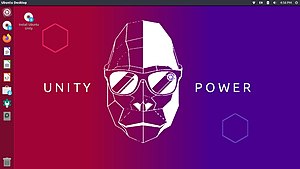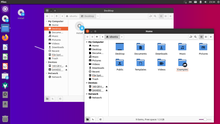Ubuntu Unity
 | |
 Ubuntu Unity 20.10 "Groovy Gorilla" | |
| Developer | Rudra Saraswat |
|---|---|
| OS family | Linux |
| Working state | Active development |
| Source model | Open source |
| Latest release | 20.10 / 22 October 2020 |
| Kernel type | Monolithic (Linux) |
| Userland | GNU |
| Default user interface | Unity |
| License | Mainly the GNU GPL among various others |
| Official website | ubuntuunity |
Ubuntu Unity is a Linux distribution based on Ubuntu, using the Unity interface in place of Ubuntu's GNOME Shell. The first release was 20.04 LTS on 7 May 2020. Prior to the initial release it had the working names of Unubuntu and Ubuntu Unity Remix[1][2]
History
The Unity interface was originally developed by Canonical Limited and first included as the default interface in Ubuntu 11.04, which was released in April 2011. Unity was developed as an alternative to the GNOME Shell, which replaced the GNOME 2 interface. At that time Canonical had planned to converge the desktop, cellphone and tablet interfaces into Unity 8, a project that was abandoned in 2017 when Ubuntu moved to the GNOME 3 desktop instead, ending Unity development at version 7, version 8 being incomplete. Ubuntu 17.04 introduced the GNOME 3 desktop in April 2017, but it was not universally accepted by Ubuntu users or developers. A number of forks were proposed, with UBports taking over Unity 8 development for its value as a cellphone interface and renaming it Lomiri in February 2020. In 2019 Canonical gave its approval for the use of trademarks for a Unity 7 Ubuntu remix.[3][4][5][6]
Linux Foundation Certified Developer and Ubuntu team member Rudra B. Saraswat, who is based near New Delhi, India, started Ubuntu Unity. He polled users and used a stock Unity 7 interface with the Ubuntu backend and minimal changes otherwise. He included the Nemo file manager as an alternative to GNOME Files and employed the LightDM X display manager to replace Ubuntu's GNOME Display Manager.[2][7][8][9]
Saraswat had previously created several other Linux distributions, including the server-focused Krob Linux. About his motivations for starting Ubuntu Unity, Saraswat stated, "I had used Ubuntu 17.04 back when I was 8 [years old] and I really loved Unity7, so when Unity7 was discontinued by Canonical, I wasn't happy and wanted to bring it back. I created this project to give Unity7 a new life." Saraswat was ten years old in 2020 when he first released Ubuntu Unity. He has indicated that his goal is to eventually have the distribution accepted as an official Ubuntu "flavour".[2][7][9][10]
Releases
Ubuntu Unity 20.04 LTS


This release was the first Ubuntu Unity release, as well as the first long term support release. It was released on 7 May 2020, two weeks after the release of Ubuntu 20.04 LTS. It uses a default Yaru theme with Papirus icons with Adwaita, Ambiance, Radiance and High Contrast themes available.[2][8][11]
This initial release attracted the attention of the tech press and was widely reported.[8][12][13]
In a review in Forbes, Jason Evangelho stated, "If you’re yearning for the good ole' Unity and Compiz days, I bring awesome tidings: someone's shining a new spotlight on them, and the stage underneath is a brand new Linux distribution called Ubuntu Unity Remix 20.04."[8]
Jack Wallen of TechRepublic wrote, "Unity is back as is your ticket out of a world of inefficient desktop interfaces that made using a laptop a less-than-ideal proposition. For those who've lauded Ubuntu's choice to switch to GNOME, fear not--Ubuntu is sticking with GNOME. Unity, on the other hand, has made its return, thanks to the likes of the Ubuntu Unity desktop distribution. It's a fresh take on an old, once defunct favorite."[12]
Marius Nestor reviewed the release in 9to5Linux, stating, "I took Ubuntu Unity Remix 20.04 for a spin and it brought back good old memories for me. The spin looks great and works like a charm."[13]
Eric Londo of Linux++ reviewed the new release, saying, "Yes, this was the old Unity I used to know and love, but somehow it felt fresher. As I worked to regain muscle memory over the key-bindings (GNOME really can take over the way you control your system XD), the experience was smooth, graceful, and fun in a way that is unique to the Unity experience. During the testing, I did not encounter a single issue that I would deem detrimental or even annoying. Everything from the Dash to the file manager and theming appeared to be just where it had left off, not skipping a beat. Congratulations to Rudra Saraswat on bringing Ubuntu Unity back to life."[14]
Adam Hunt of Full Circle magazine, wrote, "this release can’t be termed "groundbreaking" or "a game-changer", but it does show exactly where the mainstream Ubuntu could have been today if it had not left Unity 7 behind for the Gnome Shell."[15]
The first point release was made on 6 August 2020, on the same day as the other Ubuntu flavours and included fixes for a number of small issues.[16]
A 19 October 2020 review by John Perkins in Make Tech Easier faulted the release for its high idle RAM and CPU use, and noted, "the main thing that sticks out as a con to me is the wallflower factor. Nothing about Unity really sticks out. Aside from the search function, the appearance, look and feel of Unity doesn’t have anything special enough to keep me coming back."[17]
Ubuntu Unity 20.10

This standard release came out on 22 October 2020.[18]
The version incorporates Linux kernel version 5.8 and uses GNU GRUB for both BIOS and UEFI booting. It also adds fixes and updates for many user interface issue, including adding the Compiz settings manager, with many plugins and effects. It also introduces a new default theme of Arc-darker, new wallpaper and a new Yaru-Purple theme and icon theme.[19]
In a review of the first alpha version, Marius Nestor wrote in 9to5 Linux, "I took it for a test drive, and, to my surprise, everything works a lot faster than version 20.04."[20]
A review of the final release on Debug Point, Arandam Giri praised Ubuntu Unity's efficiency and how it improved user productivity.[21]
A January 2021 review in Full Circle magazine noted: "Ubuntu Unity 20.10 is a very strong release. It builds on the success and all the tech press attention that the first release garnered and shows developer commitment to taking Ubuntu Unity further, with the goal of gaining official status.Adding the CompizConfig Settings Manager, more window and icon themes, and a wide array of wallpaper choices, plus settling on Thunderbird for email and Nemo as the default file manager, shows that this development cycle is going to be focused on sharpening the user experience. This makes it worth tracking this distribution along the road to the next LTS version, 22.04 LTS, due out in April 2022. If this release is any indication, we should see good things in the future."[22]
Ubuntu Unity 21.04
Ubuntu Unity 21.04 is a standard release, scheduled for 22 April 2021.[23]
Applications
Some of the applications included by default in Ubuntu Unity are:[15]
|
|
Table of releases
| Legend: | Old version, not maintained | Old version, still maintained | Current stable version | Latest preview version | Future release |
|---|
| Version | Code name | Release date | Supported until | Remarks |
|---|---|---|---|---|
| 20.04 LTS | Focal Fossa | 7 May 2020 | April 2023 | Current LTS version |
| 20.10 | Groovy Gorilla | 22 October 2020 | July 2021 | Current non-LTS version |
| 21.04 | Hirsute Hippo | 22 April 2021 | January 2022 | Current preview version |
See also
References
- ^ Ubuntu Unity (20 June 2020). "Ubuntu Unity - Unity os Power". ubuntuunity.org. Archived from the original on 20 June 2020. Retrieved 20 June 2020.
- ^ a b c d Saraswat, Rudra (7 May 2020). "Ubuntu Unity Remix 20.04". discourse.ubuntu.com. Archived from the original on 20 June 2020. Retrieved 20 June 2020.
- ^ Sneddon, Joey (23 March 2019). "Miss Unity? An 'Ubuntu Unity Remix' Could Be on the Way…". OMG Ubuntu. Archived from the original on 20 June 2020. Retrieved 20 June 2020.
- ^ Larabel, Michael. "Ubuntu To Abandon Unity 8, Switch Back To GNOME". Phoronix.com. Archived from the original on 20 June 2020. Retrieved 20 June 2020.
- ^ Nestor, Marius (7 April 2017). "Unity 8 Now Has a New Home Over at UBports, Development Will Start Very Soon". Softpedia. Archived from the original on 20 June 2020. Retrieved 8 April 2017.
- ^ "Lomiri: New Name, Same Great Unity8". UBports Foundation. Retrieved 11 June 2020.
- ^ a b Saraswat, Rudra B. (18 June 2020). "Rudra B. Saraswat". apple.stackexchange.com. Archived from the original on 20 June 2020. Retrieved 20 June 2020.
- ^ a b c d Evangelho, Jason (12 May 2020). "A Surprising New Remix Of Ubuntu 20.04 Brings Unity Back To Life". Forbes. Archived from the original on 20 June 2020. Retrieved 20 June 2020.
- ^ a b Saraswat, Rudra (6 July 2019). "Rudra Saraswat". Launchpad. Archived from the original on 20 June 2020. Retrieved 20 June 2020.
- ^ Saraswat, Rudra (13 April 2020). "Krob Linux". Launchpad. Archived from the original on 20 June 2020. Retrieved 20 June 2020.
- ^ Conrad, AD (16 October 2019). "FocalFossa Release Schedule". wiki.ubuntu.com. Archived from the original on 31 October 2019. Retrieved 20 June 2020.
- ^ a b Wallen, Jack (15 June 2020). "Ubuntu Unity brings back one of the most efficient desktops ever created". TechRepublic. Archived from the original on 20 June 2020. Retrieved 20 June 2020.
- ^ a b Nestor, Marius (12 May 2020). "Ubuntu Unity Remix 20.04 Unofficial Flavor Sees First Stable Release". 9to5Linux. Archived from the original on 20 June 2020. Retrieved 20 June 2020.
- ^ Londo, Eric (19 May 2020). "Linux++ (May 17, 2020)". Medium.com. Archived from the original on 20 June 2020. Retrieved 20 June 2020.
- ^ a b Hunt, Adam (31 July 2020). "Review - Ubuntu Unity 20.04" (PDF). Full Circle magazine. Archived (PDF) from the original on 1 August 2020. Retrieved 31 July 2020.
- ^ Saraswat, Rudra (6 August 2020). "Ubuntu Unity 20.04.1 Released". ubuntuunity.org. Archived from the original on 6 August 2020. Retrieved 6 August 2020.
- ^ Perkins, John (19 October 2020). "Unity Desktop Review: Good for the Nostalgic Ubuntu Users". Make Tech Easier. Archived from the original on 20 October 2020. Retrieved 20 October 2020.
- ^ Laney (25 April 2020). "GroovyGorilla Release Schedule". wiki.ubuntu.com. Archived from the original on 20 June 2020. Retrieved 20 June 2020.
- ^ Saraswat, Rudra (22 October 2020). "Ubuntu Unity 20.10 "Groovy Gorilla" Released". ubuntuunity.org. Archived from the original on 28 October 2020. Retrieved 28 October 2020.
- ^ Nestor, Marius (May 2020). "Ubuntu Unity 20.10 "Groovy Gorilla" Enters Development, First Alpha Is Ready for Testers". 9to5 Linux. Archived from the original on 28 October 2020. Retrieved 15 October 2020.
- ^ Giri, Arindam (9 November 2020). "Ubuntu Unity 20.10 Review: Unity with Stability". Debug Point. Archived from the original on 9 November 2020. Retrieved 9 November 2020.
- ^ Hunt, Adam (29 January 2021). "Review - Ubuntu Unity 20.10" (PDF). Full Circle magazine. Archived (PDF) from the original on 29 January 2021. Retrieved 15 January 2021.
- ^ Laney, Iain (4 November 2020). "Hirsute Hippo Release Schedule". discourse.ubuntu.com. Archived from the original on 2 November 2020. Retrieved 9 November 2020.

